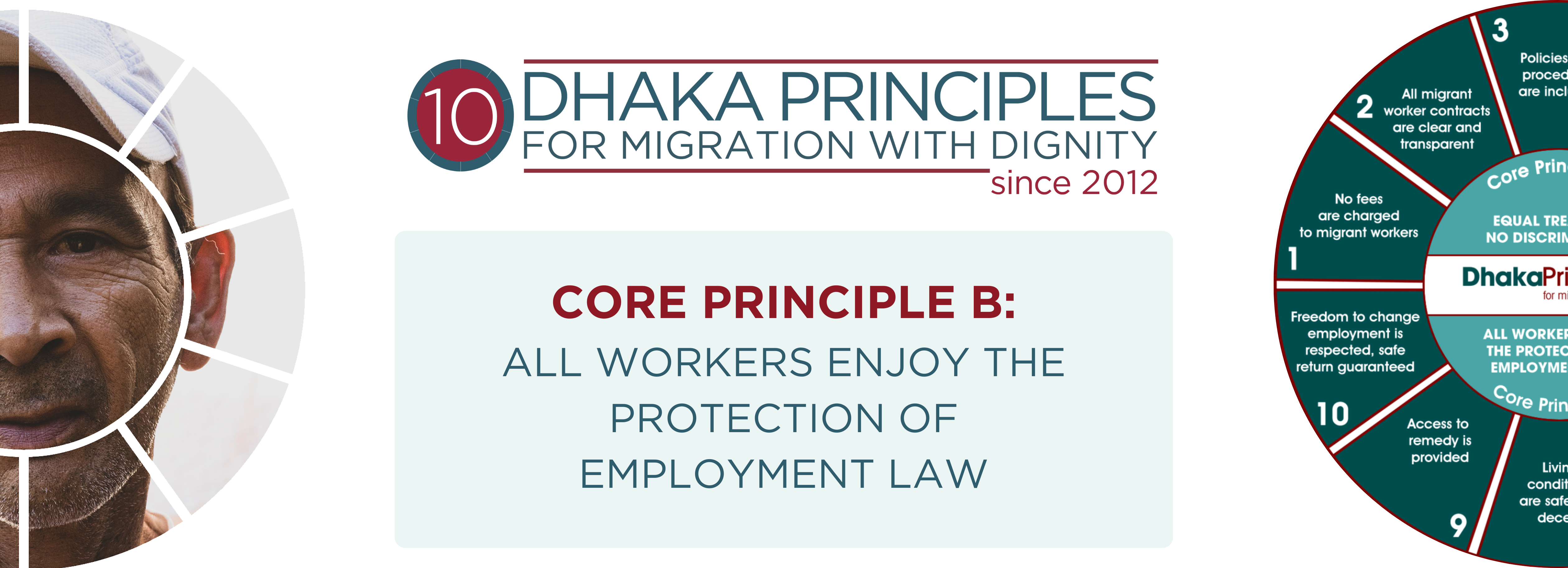Why Labour Law Protections for Migrant Workers are at the Heart of the Dhaka Principles for Migration with Dignity - Reflections from the ILO
Throughout 2022, IHRB is marking ten years of the Dhaka Principles for Migration with Dignity with guest commentaries from representatives of business, trade unions, civil society organisations, and the UN system that reflect on the continuing importance of each of the twelve individual Principles. These experts are exploring challenges relating to each Principle in turn and discussing how faster progress can be made.
The ILO estimates that between 2017 and 2019, the number of people migrating for work internationally increased from 164 to 169 million. This constitutes nearly 70% of all working age migrants, who contribute to essential jobs and the world’s economic growth and recovery. Decent work is critical to ensuring migration is a positive force for development. About half of the estimated migrant population is economically active – both at point of origin and destination – and migrant workers’ rights are inextricably linked to protection of labour rights and labour market dynamics.
Effective migration governance systems and legal regulation of the employment relationship are essential for decent and productive work to result from labour migration. Workers rights should be duly protected under the law – with their employment relationship formalised and appropriately regulated.
The Realities of Labour Law Protection for Migrant Workers
Irregular migration channels and the prevalence of informality in many migrant-dominated sectors (such as agriculture, construction and domestic work) are fraught with potential exploitation, including disguised employment relationships. Migrant workers are more vulnerable to labour rights violations, especially because they have limited access to protection and justice. This can also lead to increased risks of forced labour and human trafficking.
The Dhaka Principles’ Core Principle B is critical from a human and labour rights perspective as it clearly recalls that all workers, including migrant workers, have labour rights stemming from their status as workers, and should be protected by law.
The actions that can lead to these sorts of harms include: contract substitution, non-payment of wages, violence, harassment and discrimination in the workplace, confiscation of identity documents, deprivation of freedom of movement, freedom of association and collective bargaining, and lack of access to complaint mechanisms and effective remedies, among others.
Women migrant workers in particular face intersecting forms of discrimination at all stages of migration and employment. They are over-represented in low-paid and low-skilled jobs, receive substantially less wages than their national counterparts for the same jobs, have more limited access to social protection, and fewer options for support services. The COVID-19 pandemic has only heightened these risks.
The ILO provides technical support to governments, workers, and employers’ organisations in more than 30 countries to adopt, implement and effectively enforce regulation, policies and practices that are in line with international standards on protection of migrant workers. This includes supporting legal and institutional mechanisms in areas such as labour inspection, enforcement, licensing and protection for all workers, including migrant workers, and particularly with respect to the ILO’s Fair Recruitment Initiative.
We Have the Standards, Tools, and Guidance
International labour standards, unless otherwise stated, apply to all workers. A number of these standards, most notably the Migration for Employment Convention (Revised), 1949 (No. 97) and the Migrant Workers (Supplementary Provisions) Convention, 1975 (No. 143) seek to guarantee protection of migrant workers and decent work at all stages of migration processes – from recruitment, to employment and destination, and upon return. Adopted by representatives of governments, employers and workers, these instruments and guidelines call for equality of treatment of migrant workers and nationals and respond to the principle that labour is not a commodity and that workers should have access to freely chosen and productive employment.
The ILO’s General Principles and Operational Guidelines for Fair Recruitment provide guidance for implementing international labour standards with regards to recruitment of workers. They state that “employers should provide all workers, whatever their employment status, with the protection provided for in labour law and international labour standards as concerns recruitment.”
ILO’s General Principles and Operational Guidelines for Fair Recruitment provide guidance for implementing international labour standards.
At national level, laws and regulation must be in place and effectively enforced for decent work and labour market efficiency to be achieved. Labour authorities, trade unions, businesses, and employers’ organisations have a critical role to play in their design and implementation as well as effective monitoring of their application. Through a large portfolio of development cooperation projects in countries of origin and destination, and across migration corridors, the ILO’s multidisciplinary teams support constituents in assessing and improving relevant regulatory frameworks in line with international standards. The ILO also provides guidance, tools, training and capacity building to enhance capacities to effectively monitor compliance, identify abuses and provide improved services and access to justice mechanisms for migrant workers.
The 2012 Dhaka Principles for Migration with Dignity, which are grounded firmly on human rights instruments and ILO standards, are a critical piece of guidance and a signal of business commitment to regulated, protective, and transparent labour migration governance mechanisms and practices. In the 10 years since their adoption, the principles have contributed to global awareness and action on the subject and have since become a reference tool for company action.
The Dhaka Principles are a critical piece of guidance and a signal of business commitment to regulated, protective, and transparent labour migration governance mechanism and practices.
Dhaka Core Principle B is critical from a human and labour rights perspective as it clearly recalls that all workers, including migrant workers, have labour rights stemming from their status as workers, and should be protected by law.

COVID-19 Reminds Us of What Happens When Rights are Not Protected
The COVID-19 pandemic, with its devastating impact on migrant workers all over the world, reminds us of what happens when rights are not protected. Migrant workers, particularly those employed in precarious low-wage sectors, are among the most vulnerable and often the first to experience the shock of job losses, lack of social protection and economic supports. Their employers have also struggled to keep their businesses alive through the pandemic.
In response to the crisis, ILO reprogrammed resources toward direct services for migrant workers and their families, including for cash transfers, legal aid, shelter, job counselling and reintegration. The services have supported tens of thousands of migrant workers who were stranded or repatriated or forced to leave.
The ILO also developed a “COVID-19 rapid assessment tool and questionnaire”, adapted for 17 rapid assessments covering countries or sub-regions or areas of work (e.g. recruitment), and published a global analysis of these assessments to support countries moving forward. (see ILO (2021) Locked down and in limbo: The global impact of COVID-19 on migrant worker rights and recruitment ).
Migrant workers in many countries are still excluded from national COVID-19 policy responses.
As countries emerge from the pandemic, concerns remain. While serving on the front lines carrying out essential jobs in health care, transport, services, construction, and agriculture and agro-food processing, migrant workers in many countries are still excluded from national COVID-19 policy responses, such as wage subsidies, unemployment benefits or social security and social protection..
Recognising these challenges, the ILO Global Call to Action for a human-centred recovery from the COVID-19 crisis that is inclusive, sustainable and resilient calls for a transformative agenda across the public and private sectors aimed at eliminating violence and harassment in the world of work and discrimination on all grounds, and taking into account the specific circumstances and vulnerabilities of migrants, among others.
Today, in building forward, we can and should do better. We have the global instruments, guidance, and tools to do so. Financial and legal supports must become more equitable and inclusive of migrant workers to make real progress. We need only the political will.

This month's guest is Ms. Leighton, Chief of the Labour Migration Branch for the International Labour Organization where she directs the Office's work on labour migration and mobility, and supports policies and programs related to migrants and refugees. She has expertise in the fields of international law, labour migration, human rights, and economic development.
Type of document : Article
Country/Region : Global
Year of publication : 2022
Theme : Migrant workers
Subscribe to the Fair Recruitment Initiative Newsletter
Sign up to receive news delivered to your inbox.

